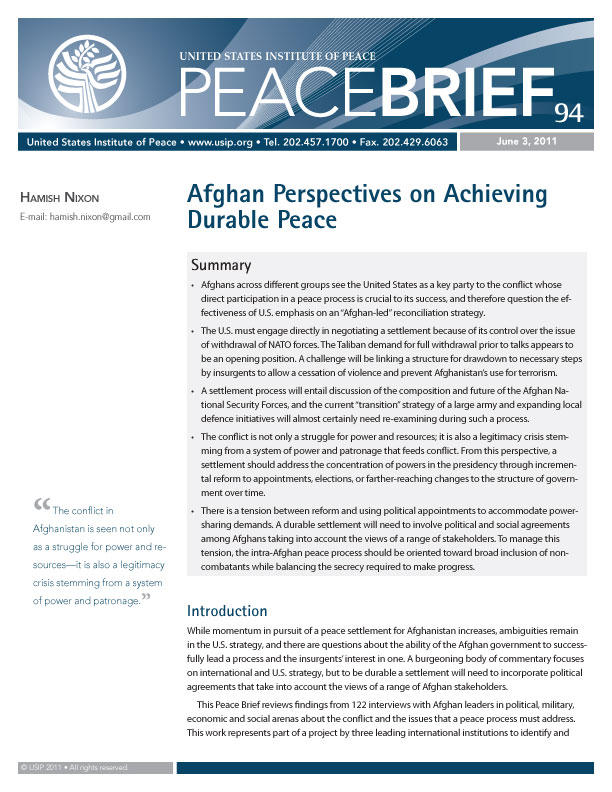Afghan Perspectives on Achieving Durable Peace
This brief outlines key findings from the first phase of research on Afghan stakeholder views on the conflict. The author worked in Afghanistan for the World Bank and the Afghanistan Research and Evaluation Unit from 2005-2010, and has researched governance and peace processes in Southeast Asia, Central America and Afghanistan.

Summary
- Afghans across different groups see the United States as a key party to the conflict whose direct participation in a peace process is crucial to its success, and therefore question the effectiveness of U.S. emphasis on an “Afghan-led” reconciliation strategy.
- The U.S. must engage directly in negotiating a settlement because of its control over the issue of withdrawal of NATO forces. The Taliban demand for full withdrawal prior to talks appears to be an opening position. A challenge will be linking a structure for drawdown to necessary steps by insurgents to allow a cessation of violence and prevent Afghanistan’s use for terrorism.
- A settlement process will entail discussion of the composition and future of the Afghan National Security Forces, and the current “transition” strategy of a large army and expanding local defense initiatives will almost certainly need re-examining during such a process.
- The conflict is not only a struggle for power and resources; it is also a legitimacy crisis stemming from a system of power and patronage that feeds conflict. From this perspective, a settlement should address the concentration of powers in the presidency through incremental reform to appointments, elections, or farther-reaching changes to the structure of government over time.
- There is a tension between reform and using political appointments to accommodate power-sharing demands. A durable settlement will need to involve political and social agreements among Afghans taking into account the views of a range of stakeholders. To manage this tension, the intra-Afghan peace process should be oriented toward broad inclusion of non-combatants while balancing the secrecy required to make progress.
About this Brief
Hamish Nixon coordinates a joint project of the Chr. Michelsen Institute (CMI), the Peace Research Institute Oslo (PRIO), and the United States Institute of Peace (USIP), on durable peace in Afghanistan.
This brief outlines key findings from the first phase of research on Afghan stakeholder views on the conflict. The author worked in Afghanistan for the World Bank and the Afghanistan Research and Evaluation Unit from 2005-2010, and has researched governance and peace processes in Southeast Asia, Central America and Afghanistan.



